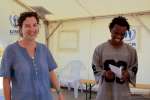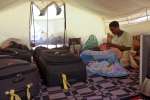More than 5,000 refugees resettled from Nepal
News Stories, 23 September 2008

KATHMANDU, Nepal, September 23 (UNHCR) – More than 5,000 refugees from Bhutan have left their camps in Nepal for resettlement countries so far this year. The United States has accepted the largest numbers, followed by Australia, New Zealand, the Netherlands, Norway, Canada and Denmark.
The resettlement programme in Nepal began only this year but quickly became one of UNHCR's largest and most promising.
In total, 4,833 refugees have left for the US, 129 for New Zealand, 131 for Australia, 22 for the Netherlands, 19 for Norway, 16 for Canada and 13 for Denmark.
More than 50,000 refugees have expressed interest in resettlement – just under half of the total 107,000 refugees originating from Bhutan who live in seven camps in eastern Nepal. Some of them have been in exile for as long as 17 years.
"Five thousand departures mean that 5,000 refugees are now starting their lives afresh," said Daisy Dell, the UN refugee agency's representative in Kathmandu. "The resettlement process has been going very smoothly, thanks to close cooperation between UNHCR, the International Organization for Migration [IOM] and the resettlement countries."
She added, "We are especially grateful to the Nepalese government for facilitating the whole process, including hosting the refugees for so many years and now issuing them exit permits promptly."
Those who left have not forgotten about their friends back in Nepal. Many have written letters about their new country and new life.
"As a matter of fact, resettlement could be the best chance to rebuild our lives," said one of the refugee women resettled to the US. "Although starting over is not easy, there is a programme for everyone with the resettling agencies, no matter what age, qualification or gender. We have seen other former refugees doing well, so we can do it as well."
According to another refugee in the US, the elderly are a little worried about their culture and day-to-day religious life. "We hope to build a Hindu temple nearby," said a recent arrival from Nepal. "We have to preserve our culture. The nearest Hindu temple is a one-hour drive away."
In Nepal's camps, UNHCR staff hold regular meetings with the refugees to answer questions about resettlement and other durable solutions. Special information sessions are organized for women at risk or people with disabilities. Refugees are being offered English-language classes as well as additional vocational and skill-based training to prepare for a life in a new country.
Another 2,000 to 3,000 refugees are expected to leave Nepal for third countries by the end of this year. At the same time, UNHCR continues to advocate for the option of voluntary return to Bhutan for those refugees who wish to do so, and hopes that talks on repatriation can restart soon.






































